
New-English-File-Upper-Int.S.B.digital
.pdf
Clive Oxenden
Christina Latham-Koenig
100% NEW
New
ENGLISH FILE
Upper-intermediate
Student’s Book
 www.oup.com/elt/englishfile/upper-intermediate
www.oup.com/elt/englishfile/upper-intermediate
2

Contents
Grammar |
Vocabulary |
Pronunciation |
1
4 |
|
|
Q and A |
|
revision: question formation |
working out meaning |
intonation, stress, and rhythm |
|
|
|
|
|
|
from context |
in questions |
|
|
|
|
|
|
|
|
8 |
|
|
Do you believe it? |
auxiliary verbs; |
personality |
using a dictionary to check word stress; |
|
|
|
||||||
|
|
|
|
|
the…the… + comparatives |
|
intonation and sentence rhythm |
|
|
|
|
|
|
|
|
12 |
|
|
You’re the doctor! |
present perfect (simple and |
illness and treatment |
consonant and vowel sounds |
|
|
|
||||||
|
|
|
|
|
continuous) |
|
|
|
|
|
|
|
|
|
|
16 |
COLLOQUIAL ENGLISH |
What does the future hold? |
|
|
|||
17 |
WRITING |
An informal email / letter |
|
|
|||
18 |
REVISE & CHECK |
What do you remember? What can you do? |
|
|
|||
2 |
|
|
|
|
|
|
|
20 |
|
|
National stereotypes: |
using adjectives as nouns, |
clothes and fashion |
vowel sounds |
|
|
|
||||||
|
|
|
truth or myth? |
|
adjective order |
|
|
|
|
|
|
|
|
|
|
24 |
|
|
Air travel: the inside story |
narrative tenses, past perfect continuous; |
air travel |
irregular past forms |
|
|
|
||||||
|
|
|
|
|
so / such…that |
|
|
|
|
|
|
|
|
|
|
28 |
|
|
Incredibly short stories |
adverbs and adverbial phrases |
confusing adverbs and |
word and sentence stress |
|
|
|
||||||
|
|
|
|
|
|
adverbial phrases |
|
|
|
|
|
|
|
|
|
32 |
COLLOQUIAL ENGLISH |
Flying high |
|
|
|
||
33 |
WRITING |
A short story |
|
|
|||
34 |
REVISE & CHECK |
What do you remember? What can you do? |
|
|
|||
3 |
|
|
|
|
|
|
|
36 |
|
|
The one place a |
|
passive (all forms), it is said that…, |
crime and punishment |
the letter u |
|
|
|
|||||
|
|
|
burglar won’t look |
he is thought to…, etc. |
|
|
|
|
|
|
|
|
|
|
|
40 |
|
|
Stormy weather |
|
future perfect and future continuous |
weather |
vowel sounds |
|
|
|
|||||
|
|
|
|
|
|
|
|
44 |
|
|
Taking a risk |
|
conditionals and future time clauses; |
expressions with take |
sentence stress and rhythm |
|
|
|
|||||
|
|
|
|
|
likely and probably |
|
|
|
|
|
|
|
|
|
|
48 |
COLLOQUIAL ENGLISH |
High risk? |
|
|
|
||
49 |
WRITING |
Expressing your opinion |
|
|
|||
50 |
REVISE & CHECK |
What do you remember? What can you do? |
|
|
|||
4 |
|
|
|
|
|
|
|
52 |
|
|
Would you get out alive? |
unreal conditionals |
feelings |
sentence rhythm |
|
|
|
||||||
|
|
|
|
|
|
|
|
56 |
|
|
How I trained my husband |
past modals; |
verbs often confused |
weak form of have |
|
|
|
||||||
|
|
|
|
|
would rather, had better |
|
|
|
|
|
|
|
|
|
|
60 |
|
|
Let your body do the |
verbs of the senses |
the body |
silent letters |
|
|
|
||||||
|
|
|
talking |
|
|
|
|
|
|
|
|
|
|
|
|
64 |
COLLOQUIAL ENGLISH |
Stage and screen |
|
|
|||
65 |
WRITING |
An article |
|
|
|
||
66 |
REVISE & CHECK |
What do you remember? What can you do? |
|
|
|||

|
|
|
|
|
Grammar |
Vocabulary |
Pronunciation |
5 |
|
|
|
|
|
|
|
68 |
|
|
The psychology of music |
gerunds and infinitives |
music |
ch and y |
|
|
|
||||||
|
|
|
|
|
|
|
|
72 |
|
|
Counting sheep |
|
used to, be used to, get used to |
sleep |
linking words |
|
|
|
|||||
|
|
|
|
|
|
|
|
76 |
|
|
Breaking news |
|
reporting verbs; |
the media |
word stress |
|
|
|
|||||
|
|
|
|
|
as |
|
|
|
|
|
|
|
|
|
|
80 |
COLLOQUIAL ENGLISH |
Music festivals |
|
|
|||
81 |
WRITING |
A formal letter |
|
|
|||
82 |
REVISE & CHECK |
What do you remember? What can you do? |
|
|
|||
6 |
|
|
|
|
|
|
|
84 |
|
|
Speaking to the world |
articles |
collocation: word pairs |
sentence stress |
|
|
|
||||||
|
|
|
|
|
|
|
|
88 |
|
|
Bright lights, big city |
uncountable and plural nouns; |
towns and cities |
word stress in multi-syllable words |
|
|
|
||||||
|
|
|
|
|
have something done |
|
|
|
|
|
|
|
|
|
|
92 |
|
|
Eureka! |
|
quantifiers: all / every, etc. |
science |
changing stress in word families |
|
|
|
|||||
|
|
|
|
|
|
|
|
96 |
COLLOQUIAL ENGLISH |
Great cities |
|
|
|
||
97 |
WRITING |
A report |
|
|
|
||
98 |
REVISE & CHECK |
What do you remember? What can you do? |
|
|
|||
7 |
|
|
|
|
|
|
|
100 |
|
|
I wish you wouldn’t...! |
structures after wish |
-ed / -ing adjectives and related |
sentence rhythm |
|
|
|
||||||
|
|
|
|
|
|
verbs; expressions with go |
|
|
|
|
|
|
|
|
|
104 |
|
|
A test of honesty |
|
clauses of contrast and purpose; |
business and advertising |
changing stress in nouns and verbs |
|
|
|
|||||
|
|
|
|
|
whatever, whenever, etc. |
|
|
|
|
|
|
|
|
|
|
108 |
|
|
Tingo |
|
relative clauses |
prefixes |
word stress |
|
|
|
|||||
|
|
|
|
|
|
|
|
112 |
COLLOQUIAL ENGLISH |
Words |
|
|
|
||
113 |
WRITING |
‘For and against’ |
|
|
|||
114 |
REVISE & CHECK |
What do you remember? What can you do? |
|
|
|||
116 Communication
121 Listening
132 Grammar Bank
146 Vocabulary Bank
157 Phrasal verbs in context
Look out for Study Link
This shows you where to find extra material for more practice and revision.
158 Sound Bank
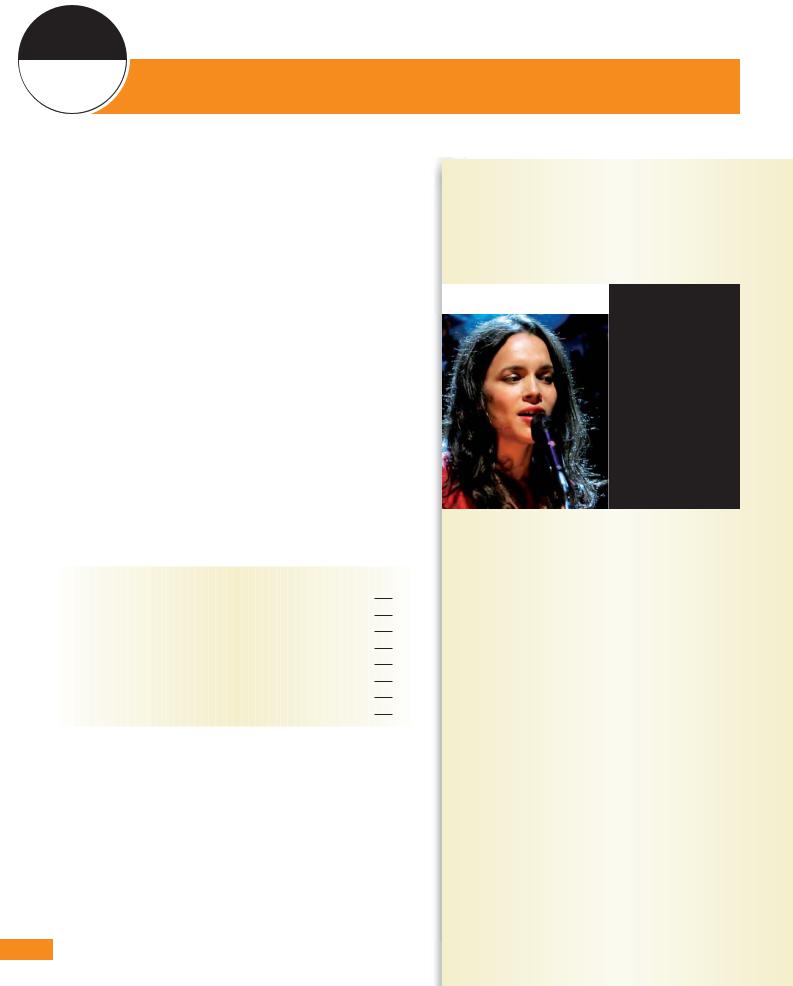
1
A
G revision: question formation
V working out meaning from context
P intonation, stress, and rhythm in questions
Q and A
1 G R AM MAR revision: question formation
aComplete the following questions with one or two question words or an auxiliary verb.
1 |
How much |
do you earn? |
|
Are |
|||
2 |
you married? |
||
3 |
|
have you been learning English? |
|
4 |
|
do you prefer, small towns or big cities? |
|
5 |
|
do you go to the theatre a year? |
|
6 |
|
tall are you? |
|
7 |
|
religion are you? |
|
8 |
|
you want to have children? |
|
9 |
|
of music do you listen to? |
|
10 |
|
advice do you listen to most? |
|
11 |
|
you ever said ‘I love you’ and not meant it? |
|
12 |
|
did you vote for in the last election? |
bCross ( ) the questions above which you wouldn’t ask a person you don’t know very well. Are there any questions which you would not even ask a good friend? Which questions might you expect to find in a magazine interview with a famous person?
c Read the two interviews. Which question is…?
the most personal the most boring the most original.
dRead the interviews again and write N (Norah) or L (Lionel).
Who…?
1 never has enough time for what he / she wants to do 2 has happy childhood memories
3 avoids answering one of the questions
4 feels guilty about something
5 is probably a fan of the Rolling Stones
6 is very proud about something
7 says he / she is an insecure person
8 needs help in his / her daily life
eIn pairs, look at questions 8–12 in the Lionel Richie interview. Find an example of…
1a question where an auxiliary verb has been added to make the question.
2 a question where there is no auxiliary verb.
3 a question which ends with a preposition.
4 a negative question.
5a question where the auxiliary verb and subject have been inverted to make the question.
f  p.132 Grammar Bank 1A. Read the rules and do the exercises.
p.132 Grammar Bank 1A. Read the rules and do the exercises.
Young star, old star
Every week the British newspaper, The Guardian, chooses people who have been in the news recently, and publishes a short interview with them called Q&A. The questionnaire often includes quite personal questions.
Q&A Norah Jones Norah Jones was born in New York and is the
daughter of the Indian sitar player and composer Ravi Shankar and the concert promoter Sue Jones; her half-sister is the musician Anoushka Shankar. A singersongwriter, her debut album,
Come away with me, sold more than 20 million copies worldwide and won her five Grammy Awards.
1Where would you like to live?
Barcelona.
2What do you most dislike about your appearance?
I am too short. I am 5ft 1in (155cm).
3Who would play you in the film of your life?
Maybe Christina Ricci.
4What’s your favourite smell?
Onion, garlic, and butter cooking in a pan.
5What’s your favourite word?
‘No’.
6Which living person do you most despise, and why?
No comment!
7What single thing would improve the quality of your life?
Probably a housekeeper.
8Who would you invite to your dream dinner party?
All my friends and Keith Richards – I think he’d be great at a dinner party.
9What’s the worst job you’ve done?
A waitressing job where I had the breakfast shift. It wasn’t the job that was so bad, just the hours. I had to go in at five in the morning.
10 |
If you could go back in time, where would you go? |
|
|
|
Summer camp in Michigan, aged 14. |
|
|
11 |
How do you relax? |
Guardian |
|
|
A hot bath. |
||
12 |
What keeps you awake at night? |
||
The |
|||
|
Music. A song will keep going round in my brain and |
||
|
From |
||
|
keep me awake. |
4
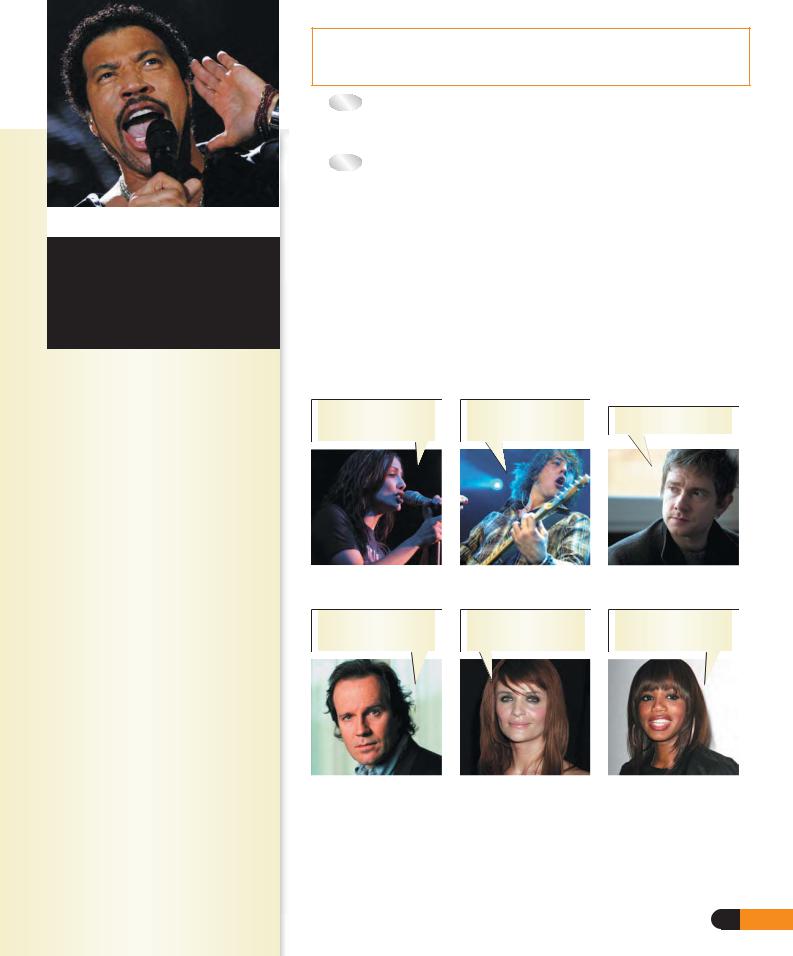
Q&A Lionel Richie
Lionel Richie was born in Alabama, USA. He became famous in the 1970s as lead singer with The Commodores and again in the 1980s as a solo singer. He is best remembered for songs like
Three times a lady, All night long, and Say you (say me), for which he won an Oscar.
1What’s your idea of perfect happiness?
Sunday by the pool, no phone calls.
2What’s your earliest memory?
My first day at pre-school. I was terrified. I’d never seen that many children in my whole life.
3What’s your most treasured possession?
My Oscar.
4If you could edit your past, what would you change?
The Commodores never did a farewell tour. We just broke up and disappeared.
5What has been your most embarrassing moment?
Forgetting the lyrics to my new single on a TV show.
6What words or phrases do you most overuse?
‘I’ll call you back’ or ‘I’ll see you soon’.
7What’s the most important lesson life has taught you?
Don’t trust the smile, trust the actions.
8What don’t you like about your personality?
I’m an egotistical maniac with an inferiority complex.
9What makes you depressed?
That there are 24 hours in a day and I need 36.
10When did you last cry and why?
At the funeral of Milan Williams of The Commodores.
11Who would you most like to say sorry to?
To my kids for not being there more.
12What song would you like to be played at your funeral?
All night long and Stevie Wonder’s I just called to say I love you.
2 P R O N U N C IATI O N intonation, stress, and rhythm in questions
Using the right intonation or tone helps you to sound friendly and interested when you speak English. Stressing the right words in a sentence helps you speak with a good rhythm. Intonation + stress = the music and rhythm of English.
a |
1.1 |
Listen to questions 1–8. In which one does the speaker sounds more |
|||||||||||||||||||
friendly and interested? Write a or b. |
|
|
|
|
|
|
|
|
|||||||||||||
1 |
|
2 |
|
|
3 |
|
|
4 |
|
5 |
|
|
6 |
|
|
7 |
|
8 |
|
|
|
b |
1.2 |
Listen and underline the stressed words in these questions. |
|||||||||||||||||||
|
|
|
|
|
|
|
|
|
|
|
|
5 |
How long have you been |
||||||||
1 |
What’s your favourite kind of music? |
|
|||||||||||||||||||
|
|
|
|
|
|
|
|
|
|
|
|
|
living here? |
||||||||
2 |
Have you ever been to a health club? |
|
|
|
|||||||||||||||||
3 |
How often do you go away at the |
|
6 |
What are you thinking about? |
|||||||||||||||||
|
weekend? |
|
|
|
|
|
|
|
|
|
|
7 |
Are you a vegetarian? |
||||||||
4 |
Do you know what’s on TV tonight? |
|
8 |
What do you do to relax? |
|||||||||||||||||
cListen again and repeat the questions in b. Try to sound as friendly as possible. Then ask each other the questions.
3 S P EAKI N G
aLook at the answers other celebrities gave to some other questions in The Guardian interview series. In pairs, try to guess what the original questions were.
|
|
La |
|
Sagrada |
|
|
|
Familia |
|
|
|
|
|
When |
|
|
England |
|
|
went |
|
out |
|
|
|
|
|
|
|
|
|
|
|
|
|
|
|
|
|
|
|
|
|
|
|
|
|
|
|
|
|
|
For |
the |
|
Labour |
|
party. |
|
|
|||||||
|
|
basilica in |
|
|
Barcelona. |
|
|
|
|
of the |
|
World |
|
Cup. |
|
|
|
|
|
|
|
|
|
||||||||||
|
|
|
|
|
|
|
|
|
|
|
|
|
|
|
|
|
|
|
|
|
|
|
|||||||||||
|
|
|
|
|
|
|
|
|
|
|
|
|
|
|
|
|
|
|
|
|
|
|
|
|
|
|
|
|
|
|
|
|
|
|
1 |
|
|
|
|
|
|
|
|
|
|
|
2 |
|
|
|
|
|
|
|
|
|
|
|
3 |
|
|
|
|
|
|
|
|
|
|
|
|
|
|
|
|
|
|
|
|
|
|
|
|
|
|
|
|
|
|
|
|
|
|
|
|
|
|
|
|
|
|
Natalie Imbruglia, singer and actress Danny Jones, from the band McFly Martin Freeman, actor
|
|
Paris |
in |
the |
first |
decade |
|
|
|
Going |
|
from |
anywhere |
|
|
|
|
Flying, |
|
|
especially |
|
|
|
|
|
of the |
|
20th |
century. |
|
|
|
|
back |
to |
|
Copenhagen. |
|
|
|
|
since |
9 |
/ |
11. |
|
|
|
|
|
|
|
|
|
|
|
|
|
|
|
|
|
|
|
|
|
|
|
|
|
|
|
|
|
4 |
|
|
|
|
|
|
|
5 |
|
|
|
|
|
|
|
6 |
|
|
|
|
|
|
|
|
|
|
|
|
|
|
|
|
|
|
|
|
|
|
|
|
|
|
|
|
|
|
|
|
|
|
|
|
|
|
|
|
|
|
|
|
|
|
|
|
|
|
|
|
|
|
|
|
|
William Boyd, writer |
Helena Christensen, top model |
Shaznay Lewis, singer from All Saints |
bNow choose six questions from the interviews to ask a partner. Only ask questions which you would be comfortable to answer yourself.
1A 5
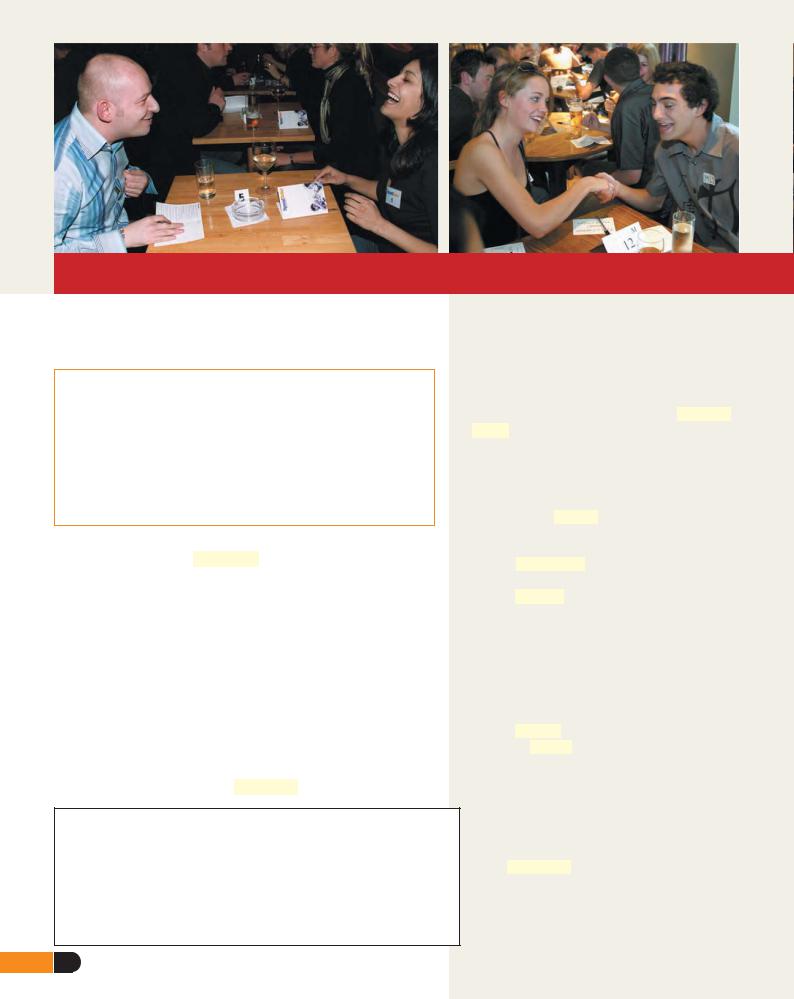
S P E E D DAT I N G S P E E D DAT I N G S P E E D DAT I N G S P E E D DAT I N G S P E E D DAT I N G S P E E D DAT I N G S P E E D DAT I N G S P E E D DAT I N G S P E
Three minutes to get to know the love of your life
4 R EAD I N G & VO C AB U L ARY
aDo you know what ‘speed dating’ is? Read the first half of the article to check, or to find out how speed dating works.
Working out meaning from context
When you are reading and you find a word or phrase you don’t know, try to guess the meaning from the context (the other words around it). Think also about what part of speech the unknown word is (e.g.
a verb, an adjective, etc.), whether it is similar to another English word you know, or whether it is similar to a word in your language.
If you still can’t work out what the word or phrase means, either ignore it and carry on reading or use a good dictionary (or glossary if there is one) to help you.
bRead the first half of the article again carefully. With a partner, say or guess what the highlighted words and phrases mean. Then check with Glossary 1.
c Using your own words, answer questions 1–4 with a partner.
1According to the writer, how did people use to get to know a prospective partner?
2 What kind of people is speed dating designed for?
3 Why does Adele Testani think three minutes is enough?
4 Why do you think that the journalist pretended to be a lawyer?
dNow read the second half of the article on page 7 and find out…
1 the advantages of speed dating (according to the participants). 2 if the journalist thinks speed dating is a good idea.
eRead the second half of the article again more carefully. With a partner, say or guess what the highlighted words and phrases mean.
Glossary 1
prospective partner someone who might |
quick-fire (a series of things) done very |
|
become your partner in the future |
quickly |
|
courtship the period of time when two |
a scorecard a card or paper where you |
|
people have a romantic relationship |
write the points, e.g. in a game |
|
before they get married |
a ‘match’ when two things or two people |
|
Mr or Ms Right (informal) the man / |
||
fit together |
||
woman who would be the perfect |
not your type not the kind of person who |
|
partner for somebody |
||
you would normally like or get on with |
||
|
61A
In recent years speed dating has become popular all around the world. Journalist, Anushka Asthana tried it out.
FINDING A PARTNER has always been a complicated process. It is a ritual which has evolved over the centuries; from a man taking food to a prospective
partner in the Stone Age to young couples having tea
together in Victorian times (under the watchful eye of an unmarried aunt) to dancing in a club to deafening music in the twenty-first century.
But now busy men and women who don’t have the time for a slow, gentle courtship have a quicker way to find a partner: speed dating, where single people have exactly three minutes to decide if the person they are talking to could be Mr or Ms Right . The idea, which started in the USA, involves bringing together people for an evening of frenzied, ‘quick-fire’ dating . This is how it works.
Small tables are placed in a line and the women sit down at the one which has been given to them. They stay at their table all evening. The men take it in turns to sit next to each woman and have a very quick conversation. After three minutes a bell rings and, even if you are in mid-sentence, it is time for the man to move to the next table. If you like the person you have just spoken to, you put a tick in the ‘yes’ box on a scorecard . If the other person chooses you as well,
this is called a ‘ match ’, and the organisers will send you the other person’s email address a couple of days later and they will be sent yours too.
‘Three minutes is enough time to talk to someone,’ says Adele Testani, who runs a speed dating company, ‘because you can get an idea of what a person is like in that time and you can eliminate them if you see immediately that they’re not your type .’
Britain’s largest ever speed dating evening took place this week at the Hydro Bar in London, so I decided to go along and see what it was all about. I pretended to be a single 24-year-old lawyer…
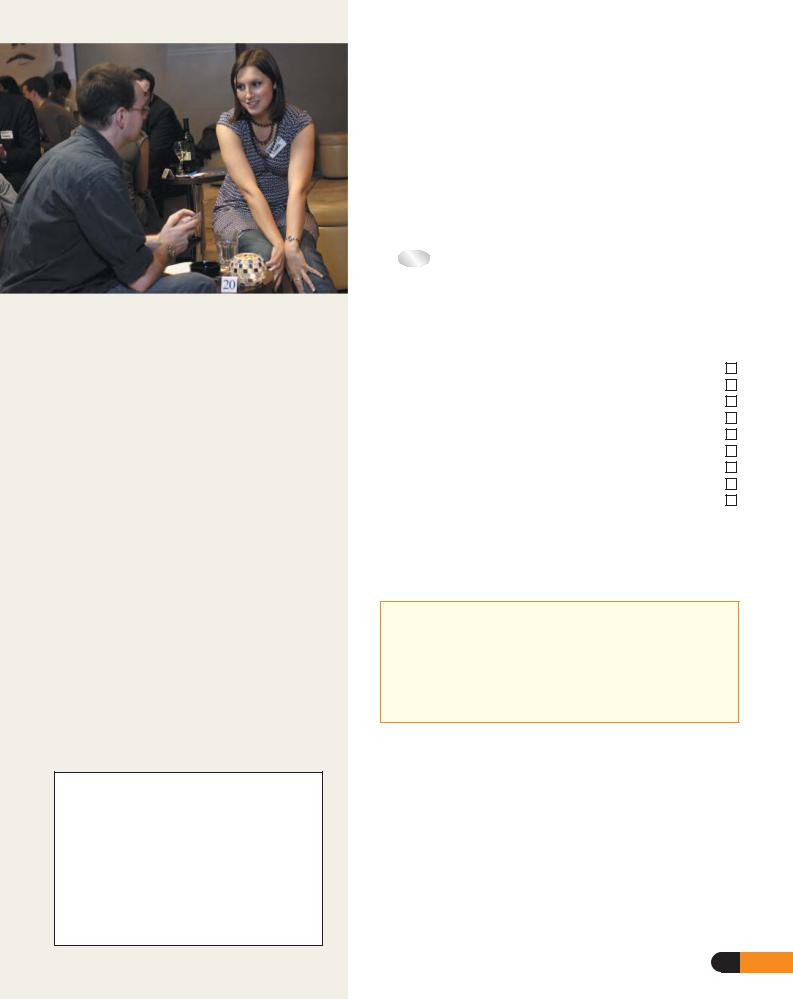
E D DAT I N G S P E E D DAT I N G S P E E D DAT I N G S P E E D DAT I N G
|
|
|
|
|
|
|
|
|
|
|
|
|
|
|
|
|
|
|
|
|
HEN I ARRIVED at the Hydro Bar, the women, who |
||||||||||
|
|
|
|
|
were wearing fashionable dresses and smart suits, |
||||||||||
|
Wwere |
|
|
nervously as they put on |
|
|
with |
||||||||
|
giggling |
||||||||||||||
|
badges |
||||||||||||||
|
|
a number on them. ‘Maybe my jeans are a bad idea,’ I thought. |
|||||||||||||
|
|
I |
|
to other people while we waited. People I spoke to |
|||||||||||
|
chatted |
||||||||||||||
|
|
said they had doubled the number of dates they had in a year |
|||||||||||||
|
|
with just one night of speed dating. The men included a chef, |
|||||||||||||
|
|
a banker, a photographer, an engineer, a management |
|||||||||||||
|
|
consultant, and a novelist. They were just pleased they could |
|||||||||||||
|
|
stop having to try to |
|
|
strangers in bars: ‘It’s so hard to |
||||||||||
|
chat up |
||||||||||||||
|
|
meet girls in London. With speed dating you meet 20 or 30 |
|||||||||||||
|
|
single girls in one night,’ said one man. ‘You can’t talk to girls at |
|||||||||||||
|
|
salsa classes,’ said another. Matt, 28, said, ‘After doing this once |
|||||||||||||
|
|
I got several dates. There’s a good atmosphere; it’s safe and it’s |
|||||||||||||
|
|
really good. It’s like being at a party with lots of single women.’ |
|||||||||||||
|
|
Then it started. I made eye contact with the girl next to me |
|||||||||||||
|
|
|
|
|
|
||||||||||
|
|
so we could compare our opinions of the men; we |
raised |
our |
|||||||||||
|
|
|
for a possibility, exchanged a smile if the man was |
||||||||||||
|
|
eyebrows |
|||||||||||||
|
|
good-looking, and made a |
|
if he made three minutes |
|||||||||||
|
|
grimace |
|||||||||||||
|
|
feel like three hours. |
|||||||||||||
|
|
I thought it was boring just to ask questions like ‘What do you |
|||||||||||||
|
|
do?’ or ‘Where are you from?’ so I tried to think of more |
|||||||||||||
Observer |
|
interesting and imaginative questions to ask, like ‘If you could |
|||||||||||||
|
be an animal, what animal would you be and why?’ |
||||||||||||||
|
|
||||||||||||||
The |
|
In the end I ticked six boxes. A couple of days later, I was told |
|||||||||||||
|
that four of the men had ticked me too. Four new dates. Not |
||||||||||||||
From |
|
||||||||||||||
|
bad in 66 minutes. |
||||||||||||||
Glossary 2
1 |
|
a small piece of metal, plastic, or |
|
cloth with words or a design on it |
|
2 |
|
an expression on your face that |
|
shows you are in pain |
|
3 |
|
laugh in a silly way because you |
|
are amused or nervous |
|
4 |
|
move the line of hair above your |
|
eye upwards |
|
5 |
|
pv talk (to sb) in a friendly way |
|
because you are attracted to them |
|
6 |
|
talk in a friendly, informal way |
f Complete Glossary 2 with the correct word or phrase.
gUsing your own words, answer questions 1–4 with a partner.
1 Why did the journalist feel a bit uncomfortable at first? 2 What kind of men went to this speed dating evening?
3 What kind of signs did she make to the girl next to her? What for? 4 What kind of questions did she think worked best?
hDo you think speed dating is a good way of meeting people? If you were looking for a partner, would you try it? What questions would you ask?
5 L I S T E N I N G
a 1.3 Listen to a radio programme about speed dating. A man and a woman who have both tried it talk about their experiences. How successful was it for them?
bListen again. Then answer the questions with E (Emily), A (Alex), or B (both).
Who…?
1 preferred to ask normal questions
2 was asked an unusual question
3 was asked the same question again and again
4 got the fewest matches
5 had a disastrous date because he / she wasn’t feeling well 6 was invited on a date which never took place
7 had a good date in spite of having had some bad news
8 realized on a date that his / her first impression was wrong 9 says he / she isn’t planning to go speed dating again
cDoes hearing about Emily and Alex’s experiences make you feel more or less positive about speed dating?
6 S P E A K I N G
GET IT RIGHT reacting and asking for more information
When you ask someone a question and they answer, it is normal to show interest, e.g. Really? , Oh yes? , Yes, me too, Me neither , I know what you mean, or by asking for more information, either with another question, e.g. And what happened then? or simply with a question word, e.g. Why? When?, etc.
aYou are going to do ‘speed questioning’ with other people in the class. Before you start, think of five questions to ask.
bWhen your teacher says ‘Start’, you have three minutes to talk to the person next to you. Ask and answer each other’s questions and ask for more information. When the teacher says ‘Change’, stop and go and talk to another student.
cWhich questions were the best for finding out about other students?
1A 7

1
B
G auxiliary verbs; the…the…+ comparatives V personality
P using a dictionary to check word stress; intonation and sentence rhythm
Do you believe it?
1 READING & SPEAKING
aLook at the signatures. Can you identify any of the people?
A
B
C
D
E
F
What your signature says about you
Your signature is the part of your handwriting that says the most about your personality. It is quite normal for your signature to change during your life, as your signature reflects how you evolve as a person. It is also common to have several signatures, for example a more formal signature (name and surname) when you sign a credit card or passport, and an informal signature (just your first name) when you sign a birthday card.
Your formal signature A signature usually contains either a first name and a surname, or initials and a surname, or, less frequently a first name and initials. Your first name represents your private or family self, and your surname represents your public self, how you are socially and at work.
If your first name is more prominent in your signature, this implies that you have positive feelings about your childhood and that your ‘private’ self is more important to you than your ‘public’ self.
If your surname is more prominent, this means that your ‘public’ self is more important to you. The more space there is between your name and surname, the more you wish to keep your public and private self separate.
If you use only initials either for your first name or your surname in your signature, this means that you are more secretive about this part of your personality (your private or public persona).
Legibility A legible signature, where names can be clearly read, implies that you are a person with clear ideas and objectives. The more illegible your signature is,
the less assertive you are as a person, and the more you tend to avoid conflict.
Angle Most signatures are horizontal, rising, or descending. A rising signature means that you are the kind of person who, when faced with problems, will work to overcome them. Usually optimistic , you are in control and ambitious .
A descending signature means that you have a tendency to get depressed and give up when faced with problems, and lack self-confidence . Some people’s signatures go through a temporary phase where they go down, which shows that they are going through a hard time or an illness. A horizontal signature suggests an emotionally stable person who is well-balanced and generally satisfied with
the way their life is going.
Size If your signature is bigger than the rest of the letter or document you have written, that means that you are self-confident and have quite a high opinion of yourself. Some people actually sign in capital letters, which suggests they are arrogant rather than self-confident. People whose signature is smaller than the rest of the text may be insecure and have low self-esteem .
bRead the first paragraph of an extract from a book about graphology. On a piece of paper, write the sentence I look forward to hearing from you, and then sign your name under the sentence.
c Now read the rest of the extract and answer the questions. According to the extract, which of the people A–F…?
|
1 |
has / had no separation between their public and |
4 |
is / was probably rather arrogant |
|
|
private self, and is / was not very assertive |
5 |
keeps / kept their public and private life separate, is / was |
|
2 |
is / was more identified with their public self, |
|
ambitious, and has / had positive feelings about their |
|
|
optimistic, and ambitious |
|
childhood |
|
3 |
is / was more identified with their private self, |
6 |
is / was secretive about their private life, and keeps / kept it |
|
|
and without much self confidence |
|
very separate from their public life |
d |
Try to guess the meaning of the highlighted words and phrases from the context. Check with your dictionary or the teacher. |
|||
e |
Now look at your partner’s piece of paper with his / her signature, and explain what it means. |
|||
f |
Did you agree with your partner’s interpretation? Do you think graphology is a serious science? Why (not)? |
|||
8
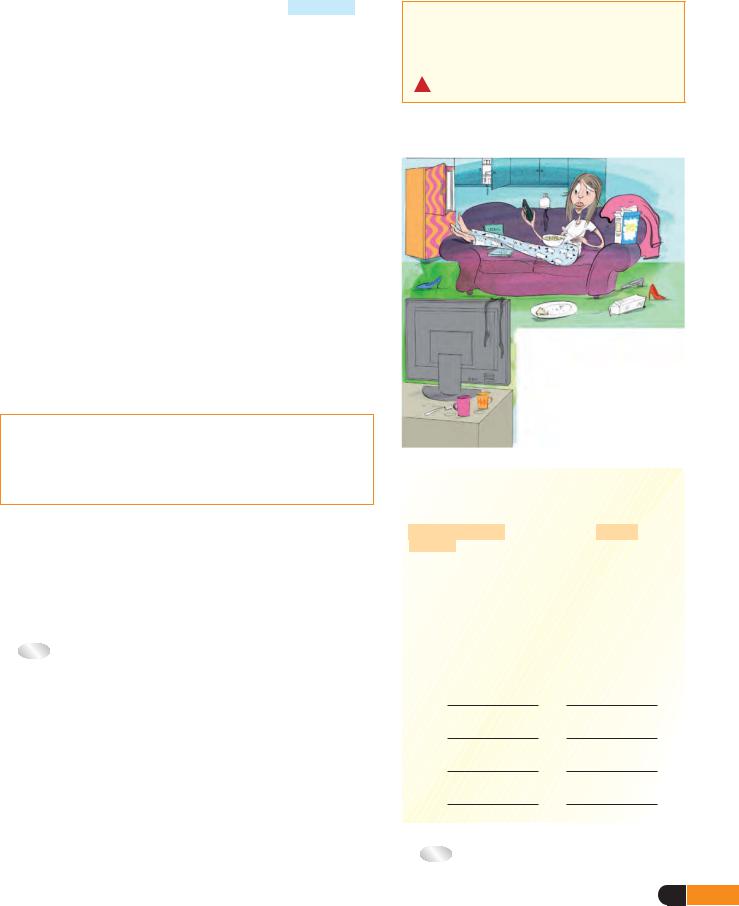
2 VOC AB U L ARY personality
aWithout looking at the text, how many of the ten highlighted adjectives / phrases can you remember?
b  p.146 Vocabulary Bank Personality.
p.146 Vocabulary Bank Personality.
cAdd either a suffix or a prefix or both to the bold words to make an adjective that fits the sentence.
1I don’t think he’s going to get very far. He’s totally unambitious . ambition
2 |
You’ll have a lively evening if Jane’s coming because |
|||||||||||||
|
she’s very |
|
|
|
|
|
|
|
. talk |
|||||
|
|
|
|
|
|
|
|
|||||||
3 |
You can’t trust John to help. He’s completely |
|||||||||||||
|
|
|
|
|
|
. rely |
|
|
|
|
|
|||
|
|
|
|
|
|
|
|
|
|
|
||||
4 |
You look very |
|
|
|
|
. Have you had some |
||||||||
|
|
|
|
|||||||||||
|
good news? |
cheer |
|
|
|
|
|
|||||||
5 |
He’s a bit |
|
|
|
|
|
|
|
|
. He said he liked my sister but |
||||
|
|
|
|
|
|
|
||||||||
|
he obviously doesn’t. |
sincere |
||||||||||||
6 |
She’s not very |
|
|
|
|
. She never has any |
||||||||
|
|
|
|
|||||||||||
|
good ideas. |
imagine |
||||||||||||
7 |
People say he’s |
|
|
|
|
|
. You can’t trust him with |
|||||||
|
|
|
|
|
||||||||||
|
money. honest |
|
|
|
|
|
||||||||
8 |
She’s so |
|
|
|
|
|
|
|
! She won’t give me a hand |
|||||
|
|
|
|
|
|
|
||||||||
|
with my homework. |
help |
||||||||||||
3P RON U NCIATION using a dictionary to check word stress
In a dictionary, word stress is shown by an apostrophe before the stressed syllable, e.g. begin /bI"gIn/. Some words, especially compound words, have a primary (or main stress) and a secondary stress, e.g. good-looking /%gUd"lUkIN/. Secondary stress is shown by a low apostrophe. It is less strong than primary stress.
a Use the phonetics to underline the main stressed syllable.
|
1 |
arrogant /"&r@g@nt/ |
7 |
possessive /p@"zesIv/ |
|
2 |
assertive /@"s3;tIv/ |
8 |
loyal /"lOI@l/ |
|
3 |
bad-tempered /%b&d"temp@d/ |
9 |
stubborn /"stVb@n/ |
|
4 |
creative /kri"eItIv/ |
10 |
impatient /Im"peISnt/ |
|
5 |
considerate /k@n"sId@r@t/ |
11 |
unsociable /Vn"seUS@bl/ |
|
6 |
conscientious /%kQnSI"enS@s/ |
12 |
immature /%Im@"tSU@/ |
b |
1.4 |
Listen and check. Are the negative prefixes or |
||
|
suffixes stressed? |
|
|
|
cPractise saying the sentences below.
1 He’s terribly bad-tempered – you need to be careful with him. 2 She’s so conscientious – she always does her best in everything. 3 He’s very easy-going – he never gets stressed.
4 His mother’s really possessive – she doesn’t want him to get married. 5 She’s so immature – she behaves like a child.
4 S P EAKI NG
GET IT RIGHT paraphrasing
If you don’t know the exact adjective you need, use a phrase, e.g. She’s the kind of person who…, He tends to…
! Remember the third person s.
Talk in small groups. Give examples where you can of people you know or have known.
What kind of person makes…?
•a bad flatmate
•a bad travelling companion
•a bad boss
•a good teacher
•a good friend
•a good politician
MINI GRAMMAR the…the… + comparatives
The more illegible your signature is, the less assertive you are as a person.
Use the + comparative adjective or adverb to show that one thing depends on another, e.g.
The sooner you do it, the easier it’ll be = how easy it will be depends on when you do it.
The colder it is, the more clothes you need to wear.
Rewrite the sentences using the…the… + a comparative adjective or adverb.
1 If you study more, you learn more.
The |
, the |
. |
2 If we leave soon, we’ll get there earlier.
The |
, the |
. |
3 If you are sociable, you have more friends.
The |
, the |
. |
4 If you are happy, you are nicer to other people. The , the .
5 1.5 S O N G l You gotta be
1B 9

6 LI STE N I N G & R EAD I N G
aRead the beginning of a magazine article. Do you know what a psychic is? Do you believe psychics have special powers or are you sceptical?
bYou’re now going to listen to Jane describing her visit to the psychic, Sally Morgan. After each part, discuss the questions with a partner.
Part 1 1.6
Answer the questions.
1What was Jane’s first impression of the room and of Sally?
2 |
What are the first questions Sally asked her? |
||||||||
3 |
Why is Jane surprised by two things Sally mentions? |
||||||||
Part 2 |
1.7 |
|
|
|
|
|
|
||
True or false? |
|
|
|
|
|
||||
1 |
Jane lived in Ireland when she was a child. |
||||||||
2 |
The psychic says there will be a new man in Jane’s life. |
||||||||
3 |
Jane is above average height. |
|
|||||||
4 |
She thinks Jane will be attracted to him by his looks. |
||||||||
5 |
Jane thinks she knows who the man is. |
||||||||
Part 3 |
1.8 |
|
|
|
|
|
|
||
Choose a, b, or c. |
|
|
|
|
|||||
1 |
Sally says that, in the future, Jane |
|
. |
||||||
|
a |
will have the same health problems as her mother |
|||||||
|
b |
will live longer than her mother |
|
||||||
|
c |
should have plastic surgery |
|
||||||
2 |
According to Sally, |
|
is good at reading and writing. |
||||||
|
a |
neither Jane’s son nor her daughter |
|||||||
|
b |
neither Jane’s ex-husband nor her daughter |
|||||||
|
c |
neither Jane’s ex-husband nor her son |
|||||||
3 |
What Sally says about Jane’s children makes |
||||||||
|
Jane feel |
|
. |
|
|
|
|
||
|
a |
convinced that Sally is a genuine psychic |
|||||||
|
b |
less sceptical about Sally being a psychic |
|||||||
|
c |
sure that Sally is not a genuine psychic |
|||||||
cRead about some typical techniques used by psychics. Match the titles with the paragraphs.
A Getting information from the client B Using a name
C The flattering statement
D Identifying common medical problems
dListen to Jane talking about her visit again. Which techniques did Sally use?
e |
1.9 Now listen to Jane talking a few weeks |
|
later. What was her final opinion about Sally’s |
|
psychic abilities? What has happened since she |
|
went to see Sally? |
fDo you know anyone who has been to a psychic? What happened?
Can psychics really see the future?
Jane Dickson investigates.
I am almost the only person I know who has never been to a psychic. Everyone I asked had a story about how key events in their lives had been predicted in some way. So I was really looking forward to my first visit to a psychic…
Tricks of the trade?
These are some of the techniques used by psychics…
1  Something psychics always do is say something that’s true of almost anyone on the planet, preferably something positive. An all-time favourite is ‘You’re intelligent with a great sense of humour’. Who is going to answer, ‘Well actually, I’m not. I’m really stupid and have no sense of humour at all’?
Something psychics always do is say something that’s true of almost anyone on the planet, preferably something positive. An all-time favourite is ‘You’re intelligent with a great sense of humour’. Who is going to answer, ‘Well actually, I’m not. I’m really stupid and have no sense of humour at all’?
2  Statistics confirm that a headache is the most common female health problem and almost 50% of men have a scar on their leg, so it’s not really surprising when a psychic ‘sees’ these problems.
Statistics confirm that a headache is the most common female health problem and almost 50% of men have a scar on their leg, so it’s not really surprising when a psychic ‘sees’ these problems.
3  A psychic can deduce a lot from your age and appearance, and most of them actually ask direct questions. It’s difficult to avoid answering if you want results, because saying nothing is like going to the doctor and refusing to discuss your symptoms.
A psychic can deduce a lot from your age and appearance, and most of them actually ask direct questions. It’s difficult to avoid answering if you want results, because saying nothing is like going to the doctor and refusing to discuss your symptoms.
4  Coming up with a few names is always impressive. The usual method is to let the client work out who it might be. ‘Does the letter s mean anything to you?’ is a frequent strategy.
Coming up with a few names is always impressive. The usual method is to let the client work out who it might be. ‘Does the letter s mean anything to you?’ is a frequent strategy.
10 1B
